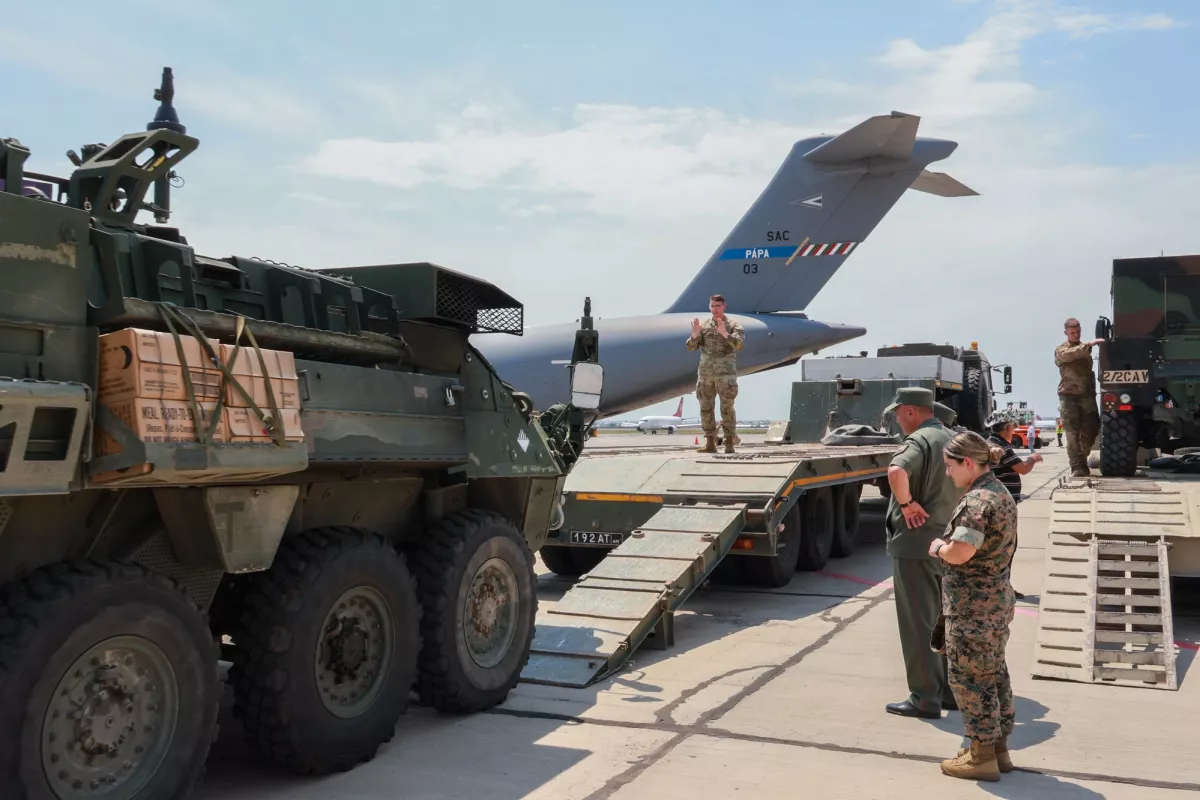How secret arms supplies to Armenia expose Washington’s true intentions Experts decode hidden motives
Recent revelations by Caliber.Az about U.S. arms supplies to Armenia suggest that some global powers may have a vested interest in disrupting peace in the Caucasus.
This raises a critical question: why did the U.S. fervently facilitate the Azerbaijani-Armenian dialogue in Washington if its underlying intention is to destabilize the region? Could this have been merely a strategic diversion?

The U.S. Embassy in Azerbaijan's swift denial of Caliber.Az's claims, without presenting concrete evidence, further fuel scepticism. Their outright rejection of reports regarding the landing of two U.S. military aircraft at Armenia’s Zvartnots airport only deepens the suspicion that the U.S. is engaging in a calculated political manoeuvre in the South Caucasus.
What are the true motives behind U.S. military aid to Armenia, and why is Washington so reluctant to acknowledge it? Caliber.Az sought answers from foreign political analysts on these pressing questions.

According to Russian military expert Alexei Khlopotov, the recent arrival of American transport planes in Armenia carrying military cargo is indicative of a multi-faceted strategy. Khlopotov offers his interpretation of the situation:
“This move represents a direct challenge to Russia and its influence, a preemptive strike against Azerbaijan’s ambitions, and could also be linked to the ongoing conflict between Israel and Iran. If we consider the latter, it appears that the U.S. is leveraging Armenia as a strategic vantage point to monitor Iranian activities using the radars supplied to the country. Türkiye, a NATO ally, seems to have been excluded from this role, prompting Yerevan to capitalize on the opportunity by demanding military supplies from the U.S. Washington, in turn, agreed to this arrangement to address its own strategic needs.
The evasive responses from U.S. officials, including the American ambassador to Azerbaijan, suggest that the military cargo might have come directly from the Pentagon which is a state within a state — through an unofficial and 'grey' channel bypassing Congress and the State Department. This hurried approach indicates that Washington was focused on urgent strategic objectives, namely tracking Iran, and thus bypassed standard procedures. This may explain the ambassador's strong denial of the aircraft's visit.
Regardless of the implications, the influx of American military supplies is unlikely to shift the power balance in the South Caucasus. The Azerbaijani military remains globally superior and would prevail on the battlefield. However, this U.S. manoeuvre is set to impact the diplomatic relationship between Baku and Washington,” Khlopotov asserts.

Belarusian military expert and reserve colonel Leonid Spatkai is confident that the United States is indeed supplying weapons to Armenia and is likely to continue doing so. His assessment is grounded in the principle of market dynamics and strategic interests.
“Consider the current peak activity of the U.S. military-industrial complex. There is a pressing need to offload surplus weaponry, and Armenia appears to be a buyer for these older systems. The U.S. is unlikely to provide Armenia with cutting-edge technology; rather, it's the outdated weaponry that will find its way there.
Politically, the U.S. operates with few obligations beyond fulfilling specific requests, especially if they are financially backed. Armenia’s strategic need for rearmament and its increased defence budget, bolstered by support from the Armenian Diaspora, create a strong demand for military supplies. The U.S. is prepared to meet this demand, aligning with its strategy to heighten tensions in the South Caucasus — a move that both challenges Russia and influences Armenia’s shift towards Western alignment," the expert says.
However, Spatkai notes that the scale of U.S. arms deliveries to Armenia is unlikely to escalate to a level that would provoke Türkiye, a NATO ally. The U.S. is cautious about such backlash, which explains its reluctance to openly acknowledge these arms shipments. For more advanced lethal weapons, the U.S. may rely on its allies, like France and India, who are also supplying Armenia.

According to Alexander Ryabtsov, a Russian political scientist and security expert, the United States appears determined to disrupt peace in the South Caucasus. This intention is evident from several of Washington's actions.
Ryabtsov argues, “The U.S. seems to be the primary force driving instability in the South Caucasus. China’s involvement in regional projects like the ‘One Belt, One Road’ initiative intensifies this dynamic. Any cooperation with Beijing is viewed as opposing U.S. interests."
The expert notes that Azerbaijan’s strong, independent stance and its cooperation with Beijing and Central Asian countries on the Middle Corridor challenge U.S. objectives.
"Baku’s proactive policies have impeded American influence, maintaining a multi-directional foreign policy and avoiding the alignment that Yerevan accepted in 2018. With Washington’s inability to control the South Caucasus for decades, it now aims to destabilize the region instead.
This strategy is especially critical now as Azerbaijan, asserting itself as a regional leader after 2020, counters U.S. efforts to forge stronger Western alliances with India and weaken China. While publicly the U.S. may denounce Azerbaijan’s actions, it is secretly arming Armenia, indicating its reluctance to see Azerbaijan emerge as a strong leader," he believes.
"The U.S.’s reluctance to acknowledge these arms shipments or respond transparently underscores Azerbaijan’s growing regional influence and its readiness to confront Washington. Such bold foreign policy contrasts with U.S. strategies in neighbouring Georgia, which have led to estrangement," the pundit adds.
Ryabtsov concludes that Washington’s attempts to destabilize the South Caucasus are likely to be unsuccessful, as coercive tactics, deception, and double standards rarely produce lasting results, especially given Armenia’s limited role as the U.S.’s sole ally in the region.








